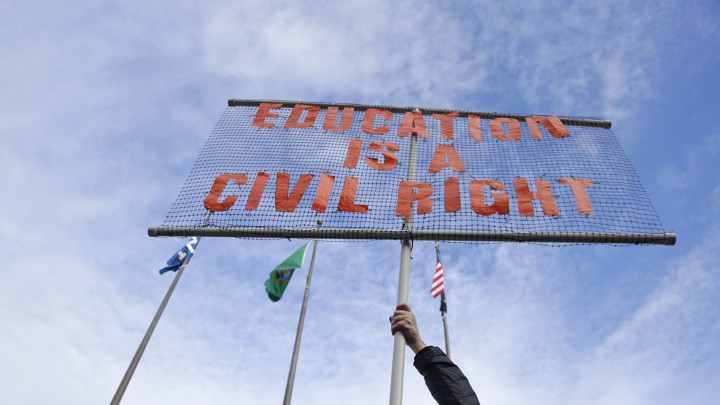by Alicia Wong
Nearly all of the world’s 180-plus countries include the term education in their constitution. Most guarantee every child the right to free education, and many make participation in some form of schooling mandatory; some even provide universal access to affordable college. For the remaining handful, the UN’s decades-old treaty on children’s rights, which stipulates various educational protections, serves as a backup, and has been ratified by pretty much every sovereign nation on the planet. Except for one.
That one country is the United States of America, a nation that prizes the idea that anyone should be able to build a better life through education and hard work. Activists have occasionally sought to address this constitutional omission through congressional legislation, grassroots campaigns, and federal litigation, but they’ve never succeeded. Of the few cases that have made it to the U.S. Supreme Court, not a single one has managed to secure a majority ruling in favor of an argument that there is an implied right to an education in the Constitution. Against this backdrop, federal litigation over educational rights has all but disappeared in the past half century. Meanwhile, the nation’s public schools continue to vary significantly in funding, quality, and academic and social outcomes.
A class-action lawsuit, which is being filed in federal court in Rhode Island Wednesday evening and was provided in advance to The Atlantic, argues that baked into the Constitution is an implicit guarantee of high-quality education—in fact, that the constitutional system could not function were this not the case.
If the lawsuit were to succeed in the nation’s highest court (if it even makes it there), it could usher in a major overhaul of the country’s education system.
The 14 plaintiffs in Cook v. Raimondo, all public-school students or parents on behalf of their children, accuse the state of Rhode Island of providing an education so inferior that the state has failed to fulfill its duties under the U.S. Constitution. But given that there is no explicit guarantee of education in the Constitution, the lawyers are making a sort of bank-shot argument: that in denying citizens of Rhode Island a quality education, the state is, in essence, preventing people from exercising their constitutional rights, such as forming a legal assembly (as is guaranteed by the First Amendment) or voting (as is guaranteed by the Fifteenth). That this denial falls unevenly across the population is a violation of the Fourteenth Amendment, which promises people equal protection under the law.


No comments:
Post a Comment